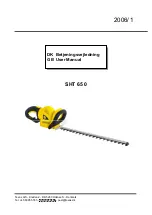
6
Tips on trimming hedges
The procedure described here can be used very often and
makes working easier. If a hedge has to be cut back very
substantially, it should be trimmed in two passes.
-
First cut the hedge to the desired height (fig. G). With
practice, it is possible to remove cut material from the
hedge with a swinging motion. To get a straight cut,
stretch a string along the hedge at the desired height.
G
H
I
J
MAINTENANCE
CAUTION:
Always be sure that the tool is switched off and unplugged
before attempting to perform inspection and
maintenance. Always wear protective gloves!
STOP
Blade maintenance
After operation, clean off the blade (both sides) with a stiff
brush (fig. K). Then wipe the blades with a cloth and coat
them with light machine oil.
The tool will stop when the carbon brushes wear to a certain
length. When this occurs, both carbon brushes should be
replaced.
To maintain product SAFETY and RELIABILITY, repairs,
carbon brush inspection and replacement, any other
maintenance or adjustment should be performed by MAKITA
Authorized or Factory Service Centres, always using MAKITA
replacement parts.
-
Trim the hedge to a trapezoidal shape (about 10 cm / 4"
in at the top for every 1 m / 3’3" of height), cutting from
bottom to top (H). In this way you avoid cut material falling
down into the area not yet cut.
-
Round off the top edges of the hedge (I), and finally trim
the bottom edges back somewhat (J).
K






































